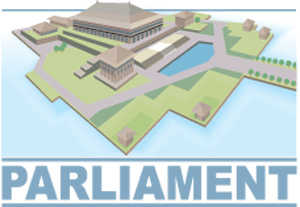Columns
Speaker fights odds to make House accessible to public, control unruly MPs
View(s): Speaker Chamal Rajapaksa has made several attempts over the past few months to make Parliament more accessible to the public, and also to make the business of the House more proactive, so that elected representatives could discharge their duties better.One like the attempted live telecast of proceedings failed, not for want of trying on his part, but due to external pressures on him. On the other hand, allowing members of the public to have easy access to the House to witness proceedings, has worked better.
Speaker Chamal Rajapaksa has made several attempts over the past few months to make Parliament more accessible to the public, and also to make the business of the House more proactive, so that elected representatives could discharge their duties better.One like the attempted live telecast of proceedings failed, not for want of trying on his part, but due to external pressures on him. On the other hand, allowing members of the public to have easy access to the House to witness proceedings, has worked better.
This week, the Speaker made another change to accepted procedure in the House at adjournment question time, by allowing up to six questions on a current issue to be raised on an allocated day during a sitting week, with three questions each for Opposition and Government MPs. The one-hour long adjournment question time will be restricted to matters of current, urgent public importance, with the Speaker deciding on the relevance of the questions raised.
The minister, under whose purview the subject of the question raised, comes is expected to remain in the House and answer the question.While the Speaker was keen to grant more time for MPs to raise issues in the House, the hour-long Oral Question Time in the House this week turned rather problematic for him, after he was angered over the time taken by some Government members to reply to questions, as well as over Opposition legislators asking supplementary questions. Each member is allowed three supplementary questions in relation to the question raised in the House.
The Speaker was particularly angry with Hambantota District MP Sajith Premadasa who was on his feet asking a supplementary question from Foreign Employment Promotion Minister Dilan Perera. After the Speaker gave repeated warnings to the UNP MP to keep his questions short, failure to do so prompted the Speaker to move onto the next question, cutting short the UNP MP’s second question. “You two are not the only members of this Parliament. There are others also waiting,” he said angrily.
With up to 15 questions listed each day, to be answered within the hour allocated for Oral Question Time, the Speaker has repeatedly asked MPs to keep their questions and answers brief, so as to save the time of the House, but his requests are often ignored, with some MPs using the time to make lengthy statements. The no-nonsense attitude taken by the Speaker also resulted in him saying at one point that, it was pointless his occupying the Speaker’s chair if MPs were not going to listen to him. “I will leave the Chair and go if no one follows my directives,” he said.
In a Parliament where all ruling Party members endorse everything good and bad in the administration, almost blindly, the Speaker has many times come to intervene with his views which are often contrary to those of the Government. A question on the ‘Mathata Thitha’ programme prompted him to make one such an intervention. When Buddha Sasana Deputy Minister M.K.D.S. Gunawardena was asked why the production of alcohol was up, despite the Government-led programme to restrict alcohol consumption, the minister sheepishly replied, “It’s because people drink more.” The Speaker interjected at this point, saying, “This is what happens when attempts are made to put ‘full stops’ to unnecessary things.”
For now at least, some of the criticism worth taking note of directed at the Government is coming from the Speaker himself. It would be refreshing if other Government MPs also learn to concede when there are blunders, instead of bending backwards to defend even the most indefensible moves made by this administration.

